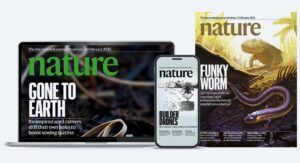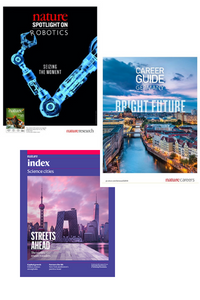Advertise in Nature journal special features in 2024
 Communicate your organization’s research and recruitment by advertising in Nature’s 2024 special features — contact us to book!
Communicate your organization’s research and recruitment by advertising in Nature’s 2024 special features — contact us to book!
Reach Nature readers and position yourself as a thought leader in your field and an employer of choice, alongside the Nature brand.
Book your spot:
- Decide which of our 2024 special features you want to advertise against — view the topics below.
- Choose whether to run display advertising and/or branded content.
- Display ads build critical awareness of your research, employer brand, job vacancies, products, or events
- Branded content uses compelling storytelling to engage Nature audiences with your message. Your article can be written by our award-winning custom media team or supplied by your organization.
- Book with us before the booking deadlines detailed in the 2024 calendar.
 Note there are 3 varieties of special feature that you can advertise in — all published in Nature:
Note there are 3 varieties of special feature that you can advertise in — all published in Nature:
i) Spotlights: profiling a specific area of scientific interest.
ii) Nature Index supplements: based on data in the Nature Index.
iii) Career Guides from Nature Careers: helping scientists around the world with job-hunting and career advice.
2024 Nature special features calendar:
View the topics in more detail.
| Publication date in 2024 | Special feature and topic | Booking deadline for branded content (print and online) | Booking deadline for branded content (online only) | Booking deadline for advertiser-supplied branded content | Booking deadline for display ad (submission of PDF) |
|---|---|---|---|---|---|
| 29 Feb | Spotlight: Cell and gene therapy | 1 Dec 2023 | |||
| 14 Mar | Nature Index: Health sciences | 24 Nov 2023 | 15 Dec 2023 | 4 Jan | 1 Mar |
| 21 Mar | Spotlight: Medical devices in China | 1 Dec 2023 | 10 Jan | 11 Jan | 8 Mar |
| 18 Apr | Spotlight: Switzerland | 15 Dec | 7 Feb | 8 Feb | 5 Apr |
| 6 Jun | Nature Index: China | 21 Feb | 27 Mar | 12 Apr | 27 May |
| 20 Jun | Spotlight: Agricultural sciences | 6 Mar | 10 Apr | 26 Apr | 10 Jun |
| Jun | Nature Index: Annual tables | NA | NA | NA | NA |
| 22 Aug | Nature Index: South Korea | 9 May | 12 Jun | 28 Jun | 8 Aug |
| 5 Sep | Career Guide: Faculty | 10 Jun | 26 Jun | 8 Jul | 26 Aug |
| 19 Sep | Nature Index: AI | 24 Jun | 10 Jul | 22 Jul | 9 Sep |
| 26 Sep | Spotlight: Green Labs | 1 Jul | 17 Jul | 29 Jul | 16 Sep |
| 3 Oct | Nature Index: Neuroscience | 8 Jul | 24 Jul | 5 Aug | 23 Sep |
| 17 Oct | Spotlight: Bench to bedside | 19 Jul | 11 Aug | 26 Aug | 7 Oct |
| 7 Nov | Spotlight: Space research | 26 Jul | 18 Aug | 2 Sep | 14 Oct |
| 28 Nov | Nature Index: Australia | 23 Aug | 18 Sep | 27 Sep | 11 Nov |
| 5 Dec | Career Guide: Industry postdocs | 30 Aug | 25 Sep | 4 Oct | 18 Nov |
| 12 Dec | Nature Index: Materials science | 2 Oct |
2024 Nature special features synopses:
Spotlight: Cell and gene therapy
With the rapid improvement of ‘chimeric antigen receptor’ (CAR) T-cell treatments for cancer, cellular therapies are having a moment. CAR-T cells are a form of immunotherapy, in which a patient’s own immune cells are genetically programmed to attack cancerous cells. Other therapeutic strategies could replace damaged or missing cells, such as the islet cells that produce insulin. Whatever their target, cell therapies are promising, but expensive and technically challenging. And each batch of cells must be customized to the patient: because the immune system attacks foreign cells, one individual’s cells cannot be used to treat another’s disease. So, some researchers are pursuing a ‘universal’ stem cell approach. Stem cells – progenitor cells that can be chemically coaxed into any desired cell type – are genetically modified to help them fly under the immune system’s radar, for instance by removing or modifying certain proteins using gene editing. Such cells could theoretically be applied to all (or at least many) patients, reducing cost and speeding treatment. But stem cells present challenges of their own: a cell that can evade the immune system is one that could theoretically run amok in the body.
Nature Index: Health sciences
The addition of high-quality clinical-medicine journals to the Nature Index for the first time allows for a detailed analysis of the organizations, countries, and regions that are at the forefront of medical advances. Ensuring such advances benefit patients often depends on successful collaboration between academia, clinical settings, and industry. This involves a number of different types of institution — including universities, research hospitals, and corporations — working together to produce cutting-edge treatments and technologies.
Spotlight: Switzerland
The upcoming spotlight on Switzerland will aim to cover some of the latest developments in Swiss research, as well as profile individual scientists who work in the country. It may take a longer look at CERN and the impact the organization has had on the country’s science scene, as well as perhaps looking more generally at how the country performs when it comes to international collaborations. It may draw on Nature Index data to investigate these trends further.
Nature Index: China
The Nature Index annual tables 2023 saw China overtake the United States in the standings for natural sciences for the first time, thanks to a broadening of scientific expertise across disciplines including Earth and environmental sciences. This supplement will explore whether China’s research profile will continue to deepen across other subjects, such as the biological and health sciences, and whether diversification of its global collaboration networks will continue to help grow its presence in the Nature Index over the coming years.
Spotlight: Agricultural sciences
The spotlight on agricultural sciences will aim to cover some of the latest developments in agriculture, with an eye on how scientists are finding ways to solve societal problems as the world faces food shortages and global heating. It may also aim to investigate how scientists are studying economic trends such as the impact on the world’s food market because of the war between Russia and Ukraine, for example.
Nature Index: South Korea
The science and innovation pedigree of South Korea has now been long established, thanks to it being one of the leading nations in the world for connecting academia and industry. It is also a shining international example of the power of research investment, boasting an expenditure on R&D that is one of the highest in the world. These factors are likely key to why it has lost less ground than most other top 10 countries in the Nature Index in the face of China’s growth. But what are the institutions and specialties that will maintain this performance, and what will be the impact of a government plan to boost regional universities and tackle the country’s demographic challenges?
Career Guide: Faculty
The career guide on faculty will aim to provide help and advice for members of academic faculties with some of their career issues.
Nature Index: Neuroscience
The future of neuroscience holds immense potential as advancements in technology, interdisciplinary collaborations and a deeper understanding of neurological processes converge. Unprecedented insights into the human brain, underpinned by cutting-edge imaging techniques and ever-expanding global datasets, are expected to pave the way for clinical applications that will impact healthcare, education, and our understanding of human cognition, consciousness, and behavior. This supplement looks at the leading individuals and institutions in neuroscience globally, and the discoveries that are propelling the field forward.
Spotlight: Bench to Bedside
The spotlight on bench to bedside programmes will aim to investigate the process of moving science out of the lab and into the clinic, with a focus on recent funding streams dedicated for that purpose. It will likely profile significant figures who have successfully moved their research into the clinical environment.
Nature Index: Artificial intelligence
One of the most rapidly advancing areas of scientific research, artificial intelligence (AI) is revolutionizing industries and attracting enormous amounts of investment as nations compete for leadership in the field. Demand for AI talent continues to escalate in sectors such as healthcare and energy, as do opportunities for countries and institutions to strengthen cross-border collaborations in AI to address urgent global challenges in climate change and sustainability. Ethical considerations also remain at the core of AI research. This supplement will explore some of the most transformative and exciting developments that will be pivotal in shaping the future of AI, while also highlighting initiatives to safeguard against biases and ensure transparency.
Spotlight: Space research
The spotlight on space research will aim to cover some of the latest developments in space research, with an eye on how scientists are using space research to track global trends in global warming and pollution. It may also aim to investigate the move of privately-funding companies, rather than governments, into space.
Nature Index: Australia
With a thriving research landscape and a commitment to fostering innovation and knowledge advancement, Australia punches above its weight in many fields. The country’s strong focus on health and medical research, for example, driven by world-class institutions that specialize in areas such as cancer research, infectious disease, and personalized medicine, makes it an invaluable partner in international collaborations and a go-to destination for young talent. Australia’s unique geography and environmental challenges also place considerable urgency on research related to sustainability, climate change, and biodiversity conservation. As universities across Australia navigate the after-effects of COVID-19 lockdowns and border closures, smart funding and investment decisions will be crucial in shoring up the country’s strong standing as one of the leading countries in scientific research.
Career Guide: Industry postdocs
The career guide on faculty will aim to provide help and advice for members of academic faculties with some of their career issues. Previous career guides on faculty have covered hiring and being hired, research philosophies, and diversity in science.
Nature Index: Materials science
One of the most dynamic and innovative areas of scientific research, materials science is informing solutions to our greatest global challenges, including energy and sustainability, mobility, urban living, and health. Driven by rapid increases in computing power and AI, scientists are creating stronger, tougher, and more versatile materials to push boundaries in key industries. This supplement looks at some of the most exciting developments in materials science. It highlights the institutions, disciplines, and individuals behind the most prolific materials-science collaborations and explores global hubs of commercial success.
Contact us for more details and to book your spot >>



